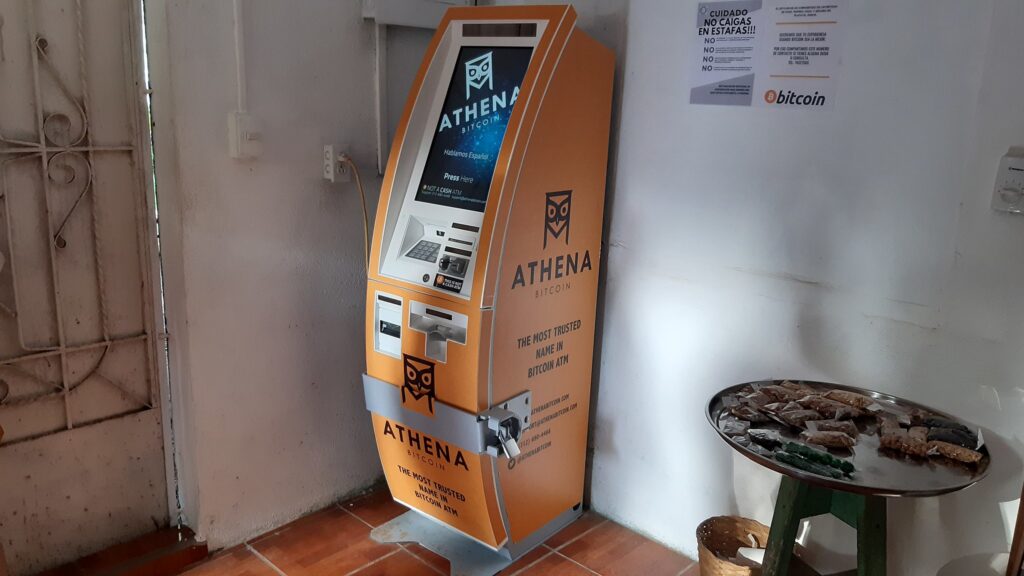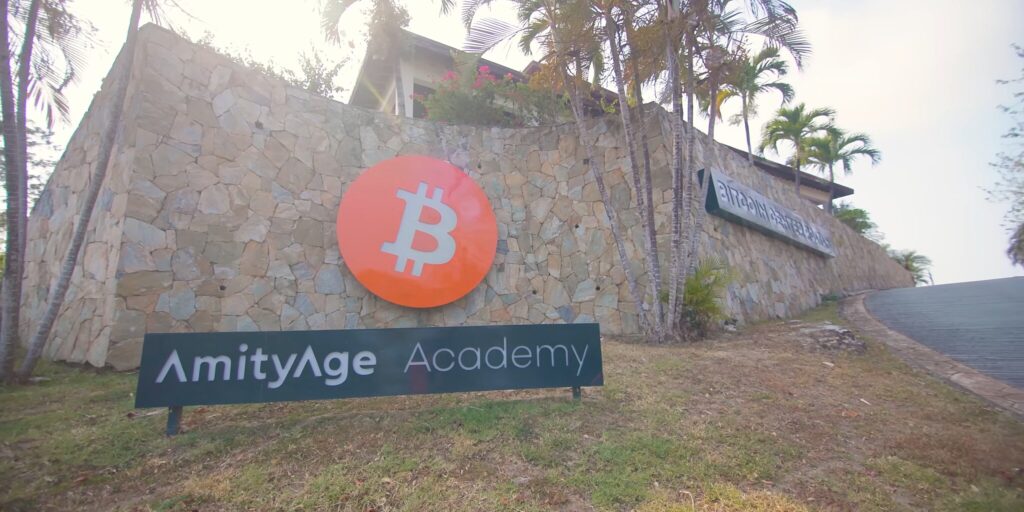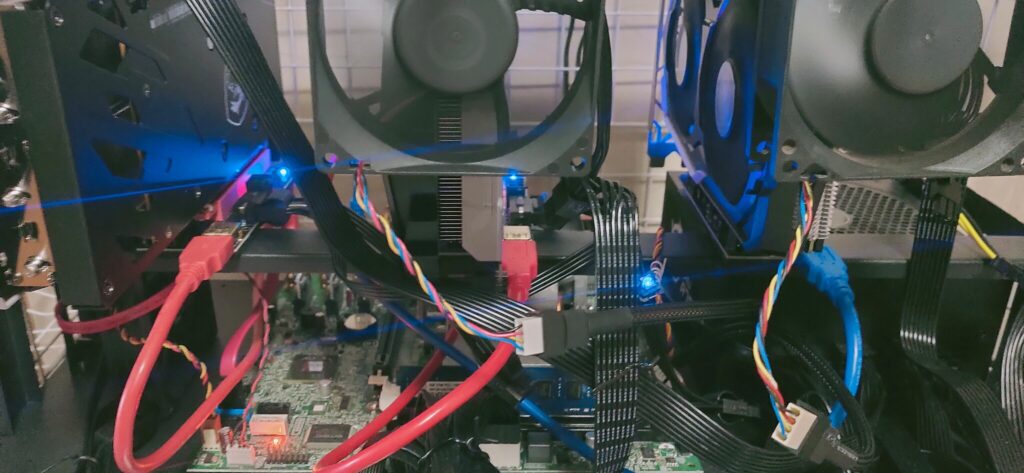While Bitcoin Fuels World Leaders’ Ambitions, Poor Communities and the Environment Pay the Price
While Bitcoin Fuels World Leaders’ Ambitions, Poor Communities and the Environment Pay the Price
Donald Trump has been quick to crown himself the first “Crypto President.” After receiving $120 million in donations from major crypto players, he’s now pushing his own Bitcoin ventures and “meme coin,” offering dinner dates to top investors. Pumping crypto markets to all-time highs, he’s set up a Crypto Task Force, tasked with bringing digital assets into the mainstream. He’s even established a Strategic Bitcoin Reserve and Digital Asset Stockpile from coins confiscated from criminals. However, Trump’s not the first world leader to go all-in on crypto. From Bhutan to Buenos Aires, pro-crypto policies have proved to be vote winners for populist politicians.[1]Antulio Rosales et al., “Poor Miners and Empty E-wallets: Latin American Experiences with Cryptocurrencies in Crisis,” Human Geography 17, no. 1 (2023): 43–54, … Continue reading The downsides, meanwhile, are falling disproportionately on the shoulders of the poor.[2]Peter Howson et al., “Crypto/Space: Computational Parasitism, Virtual Land Grabs, and the Production of Web3 Exit Zones,” Political Geography 115 (November 2024), … Continue reading
Pushing Crypto in the Global South
In 2021, El Salvador’s populist president Nayib Bukele bet his country’s economy on Bitcoin. As well as promising a “Bitcoin City” megaproject, Bukele has forced every business in the country to recognize crypto as a legitimate currency with parity to the US dollar. The gamble has so far proved an unmitigated failure. Last month, under pressure from the International Monetary Fund, and a near-complete lack of interest from Salvadorans to buy anything with Bitcoin, obligations to accept it were quietly shelved.
Bukele had been influenced by Mike Peterson, a US expat and Bitcoin enthusiast who in 2019 set out to turn El Salvador into a Bitcoin utopia.[3]Howson et al., “Crypto/Space.” Peterson attempted to turn the small coastal town of El Zonte into Bitcoin Beach: a tax-free libertarian circular economy where people could pay for anything, from groceries to electricity bills, using Bitcoin. Mangroves were destroyed and residents displaced to make way for an airport to serve the vision. Though unsuccessful, Bitcoin Beach inspired a series of loosely networked Bitcoin-themed developments across the Global South. Most were grandiose pipe-dreams, but a few of these spaces were transformed into experimental crypto-economic sandboxes.

The Central African Republic (CAR) has followed El Salvador’s lead. In May 2022, CAR became the second country to adopt bitcoin as a national currency. Like El Salvador, CAR is planning a crypto-friendly free-trade zone powered by Bitcoin, and a new government issued cryptocurrency called Sango. Despite being ruled unconstitutional by the nation’s highest court, foreign speculators were lured with business licenses, land rights, and special access to the country’s natural resources.
In Bhutan, the government has sacrificed the development of a $1 billion “Education City” megaproject, dedicating land and energy instead to Bitcoin mining operations. The small land-locked country’s prime minister, Tshering Tobgay, has short-term hopes that Bitcoin’s high prices will avert a looming economic crisis. But, as well as forfeiting the benefits of the Education City, Bhutan’s Bitcoin efforts use huge amounts of energy and water, generating noise and pollution that disturbs areas of cultural and spiritual significance to local communities.[4]Howson et al., “Crypto/Space.”
Right-wing disciples of decentralization are continuing their crusades toward new crypto Jerusalems. These “crypto colonists” take advantage of economic instabilities, weak regulations, and access to cheap energy and other resources.[5]Peter Howson, “Climate Crises and Crypto-Colonialism: Conjuring Value on the Blockchain Frontiers of the Global South,” Frontiers in Blockchain 3 (May 2020), … Continue reading On the Honduran island of Roatán, for example, development of an exclusive crypto city called Próspera broke ground in 2020. An amendment to the country’s constitution in 2013 allows foreign companies to push out locals, making way for new gated communities, exclusive hotels, and golf courses. As a charter city, Próspera had its own laws designed to inspire tax-free, crypto-friendly innovation. Próspera hoped to become a mecca for medical trials that tended to be too costly to carry out where pesky regulations apply.[6]Laurie Clarke, “This Biohacking Company Is Using a Crypto City to Test Controversial Gene Therapies,” MIT Technology Review, February 13, 2023, … Continue reading One of the island’s new residents was the biotech start-up Minicircle. The company reportedly shipped in human guinea pigs who’d purchased golden tickets as NFTs. The chosen few were “biohacked” in exchange for cryptocurrency. And, if the Follistatin gene therapy worked, sent home with huge muscles.
Próspera promised 10,000 new jobs, but the development continues to provide limited opportunities for locals or tax revenues to fund the country’s ailing social services.[7]Howson et al., “Crypto/Space.” When incoming nominally leftist President Xiomara Castro, attempted to overturn Próspera’s licences, the developers brought a claim before the International Centre for Settlement of Investment Disputes (ICSID). The $10 billion claim was part of the United States Free Trade Agreement (CAFTA-DR), which was designed to protect US investments in the region. According to Próspera CEO, Erick Brimen, “It’s not just the cost, it’s the message that the Honduran government are expropriating a US investment. I mean that’s got to have a multiple of $10 billion in negative affect.”[8]Howson et al., “Crypto/Space.”

Bitcoin’s Damaging Environmental Footprint
Trading crypto might seem like harmless fun, but the industry’s environmental impacts are global. Cryptocurrency projects predate on poor and marginalized groups, appropriating energy and other resources.[9]Peter Howson and Alex de Vries, “Preying on the Poor? Opportunities and Challenges for Tackling the Social and Environmental Threats of Cryptocurrencies for Vulnerable and Low-income … Continue reading Bitcoin uses as much energy as the whole of Poland. Most of this energy is generated from fossil fuels that emit nearly 100 Mt of CO2 per year, roughly the same as Qatar. Not bad for a currency that almost no one uses to purchase anything, besides other cryptocurrencies.[10]John Hawkins, “Almost No One Uses Bitcoin as Currency, New Data Proves. It’s Actually More Like Gambling,” The Conversation, June 22, 2023, … Continue reading Thanks to influence from Trump and other powerful advocates, new speculators are causing Bitcoin’s price and electricity demand to swell.[11]Peter Howson, “Bitcoin Isn’t Getting Greener: Four Environmental Myths about Cryptocurrency Debunked,” The Conversation, February 17, 2021, … Continue reading
Though our digital lives affect the environment in myriad ways, Bitcoin’s big environmental impacts don’t only stem from temperature-controlled data centers, from which all the ones and zeros get transmitted. Bitcoin’s massive energy demand comes from how the so-called digital gold is “mined.” The ways different cryptocurrencies are produced varies, but the two most common methods are called Proof of Work (used by Bitcoin) and Proof of Stake (PoS, used by Ethereum). Bitcoin’s Proof of Work mining mechanism is a controlled way of wasting energy. The process involves specialist computers repeatedly making random guesses at a long string of digits. The amount of computing power dedicated to this guess-the-number game is referred to as Bitcoin’s hash rate. The hash rate has grown from around 90 exa-hashes per second (EH/s) in 2021, to around 800 EH/s as I write this—800 quintillion guesses (800 followed by 18 zeros). For comparison, the world’s most powerful supercomputer, the HP Enterprise Frontier, is capable of completing just over one quintillion operations per second.
If the hash rate drops for any reason, because of power cuts for example, the difficulty of the guessing game is automatically adjusted to ensure the network can find a new winner every ten minutes. And every ten minutes a new winner gets a go at verifying transactions occurring on the network in exchange for three newly minted Bitcoins as a thank you.

Whether the effort is profitable or not depends on where the electricity comes from. Most miners head for war-torn or corrupt countries with rusty environmental regulations and energy grids, and cheap electricity to match.[12]Howson and de Vries, “Preying on the Poor?” When the Bitcoin price is low, most miners lose interest. But with the Bitcoin price climbing to over $100,000 per coin, there’s a massive financial incentive to burn through as much energy as possible.
Bitcoiners rely on specially tailored machines, each about the size of a toaster, that use three times more energy than the average house, to guess random numbers 24/7, 365 days a year. The machines generate a lot of heat and burn out quickly. Mining machines are application specific. They’re tailor-made to play guess the random number. Unlike a regular computer, they can’t easily be repurposed for anything else. Globally, burnt out machines create around 30,400 tons of e-waste each year—about the same as the Netherlands.[13]Alex de Vries and Christian Stoll, “Bitcoin’s Growing E-waste Problem,” Resources, Conservation and Recycling 175 (December 2021), https://doi.org/10.1016/j.resconrec.2021.105901. Much of this e-waste is dumped in the Global South.[14]Howson and de Vries, “Preying on the Poor?” Bitcoin miners also tend to rely on large quantities of fresh water for cooling. In 2022, Bitcoin’s annual potable water footprint was roughly 2,237 billion liters.[15]Alex de Vries, “Bitcoin’s Growing Water Footprint,” Cell Reports Sustainability 1, no. 1 (2024), https://doi.org/10.1016/j.crsus.2023.100004. The industry is exacerbating water shortages in Texas.[16]de Vries, “Bitcoin’s Growing Water Footprint.” Taiwan, responsible for 90 percent of the world’s mining machine chip production, has resorted to cloud seeding, water desalination, inter-basin water transfers, and halting irrigation for 180,000 hectares to address the increasing water needs of its crypto economy.
Whether Bitcoin is using more resources than a small village or a big country, it can’t scale up. It can’t process more than seven transactions per second. In comparison, the Visa network alone can facilitate up to 65,000 simultaneous payments with one million times less energy than it takes to make a Bitcoin payment. And Bitcoin payments are far from instantaneous. Most payments take several hours to complete—if they complete at all.
Threatening Democracies
Given its inefficiency, understanding Bitcoin’s popularity is difficult for those with limited sympathies toward the right-wing politics of its proponents. Bitcoin was put together in the aftermath of the global financial crisis by right-leaning libertarian activists. They were upset with politicians meddling with bank bailouts and economic stimulus schemes. Today, the global crypto industry is reliant on crypto-friendly politicians to keep markets buoyed. The cabal of crypto companies, including Coinbase and Ripple Labs, was the largest corporate political donors in 2024, spending more than Big Oil, Big Tobacco, and Venture Capital combined. The crypto kingmakers are set to hand over another $80 million to crypto-friendly candidates before the 2026 US midterms.
For Bitcoin enthusiasts, the waste and inefficiency aren’t a bug or accidental side effect. The waste enables immutable, censorship-resistant security, free from government interference. Herein lies the risk to our democracies. Because the only real affordance crypto projects offer is in subverting political institutions, it makes sense that these projects are generally only useful for people harboring hostilities toward those institutions. Afterall, cryptocurrencies can’t fix political problems. They only exacerbate them. Today, prominent so-called Bitcoin maximalists, from US radio host Alex Jones to Andrew Tate, are all disproportionately on the extreme right of the political spectrum. Right-wing activists created crypto, while white supremacists continue to take a shine to it, with Bitcoin in particular reshaping the racist right in radical ways.[17]Howson et al., “Crypto/Space.” According to a 2021 Hatewatch report, many prominent racist terrorists were crypto early adopters.[18]Michael Edison Hayden and Megan Squire, How Cryptocurrency Revolutionized the White Supremacist Movement (Southern Poverty Law Center, 2021). Patrik Hermansson, of the Hope Not Hate watchdog, explains:
In the UK, most far-right activists have been quick to start taking crypto donations, from Tommy Robinson to Patriotic Alternative. And this is for practical reasons. They’re de-platformed from other payment rails, like PayPal and Stripe. They may have their bank accounts frozen. Crypto effectively solves this problem. And extra anonymity is also useful. The risk of being publicly exposed as a financial supporter for a violent far-right cause usually deters other donors.[19]Peter Howson, Let Them Eat Crypto: The Blockchain Scam That’s Ruining the World (London: Pluto Press, 2023), 178.
According to Hermansson, the fascism-for-followers playbook was pioneered by the UK’s Stephen Yaxley Lennon (a.k.a. Tommy Robinson). Lennon founded the now defunct English Defense League. A former BNP affiliate and fascist football hooligan, he’s widely understood as the spiritual and intellectual leader of the UK far right.[20]Wessel Haanstra and Fenna Keijzer, Learning from Adjacent Fields: The Relation between Extremism and Hooliganism (RAN Centre of Excellence, 2018). His recent social media posts, sent from Cyprus after fleeing a UK arrest warrant encouraging racists to “rise up,” were viewed 1.2 billion times on X (formerly Twitter). In 2018, after one of many arrests for breaching the peace and inciting violence, Lennon’s social media following increased significantly. Meanwhile, fundraisers soliciting donations in crypto to cover legal fees, pocketed him around 3.5 Bitcoins from concerned fans (about $56,000 in today’s money).
Cracking Down on Crypto
Cybercrime, terrorism, sanctions evasion, and climate change would be much easier to fix without crypto. A number of countries have banned cryptocurrencies.[21]Matteo Aquilina, Jon Frost, and Andreas Schrimpf, “Tackling the Risks in Crypto: Choosing among Bans, Containment and Regulation,” Journal of the Japanese and International Economies 71 (March … Continue reading China banned Bitcoin on explicitly environmental grounds. But crypto has had adverse impacts in other countries, including coal rich areas of Kazakhstan. Texas has also welcomed Chinese miners leaving their homeland to become the global Bitcoin superpower. Using mainly gas and coal, no other jurisdiction on Earth creates more crypto than the Lone Star state.
To keep crypto’s most negative aspects under control, cracking down on crypto exchanges or banning the import and use of mining equipment in a single country might seem a relatively easy win.
Crypto will always inhabit some dark corner of the internet, like ampules of smallpox in a Soviet-era bunker somewhere. To keep crypto’s most negative aspects under control, cracking down on crypto exchanges or banning the import and use of mining equipment in a single country might seem a relatively easy win. But to ensure localized bans don’t simply move the problem around, a coordinated international approach will be required.[22]Peter Howson, “Bitcoin: China’s Crackdown Isn’t Enough – Only a Global Effort Can Stop Crypto’s Monstrous Energy Demand,” The Conversation, June 4, 2021, … Continue reading
Ridding the internet of crypto altogether will be tricky due to an enduring myth that free-market capitalism can emancipate the poor from free-market capitalism. This myth is epitomized in books like Joshua Dávila’s Blockchain Radicals and Isaiah Jackson’s Bitcoin & Black America.[23]Joshua Dávila, Blockchain Radicals: How Capitalism Ruined Crypto and How to Fix It (Penguin Random House, 2023); and Isaiah Jackson, Bitcoin & Black America (pub. by author, 2019). Both authors argue that the poor need encouragement to get in early on cryptocurrency investments, to level the economic playing field, and enable “left behind” communities to enrich themselves and catch up with wealthy, mostly white, political elites.
But this narrative, according to academic and activist Jared Ball, is “cryptoganda.”[24]Jared A. Ball, “Cryptoganda: The Newest Bottle for Very Old Brandy,” in The Myth and Propaganda of Black Buying Power, 2nd ed. (Cham: Palgrave Macmillan, 2023), … Continue reading Ball argues that the mythology of “Black capitalism” implies that the rich acquired their wealth not through violence, but through the same modes of investment that Black communities are now being advised to use in order to get ahead. Even if some poor Black investors do strike it rich from crypto, their personal investment strategies in no way benefit their wider communities. “There is no investment pathway to collective revolutionary change or closing the material inequality gaps that exist between Black and white or any other group,” explains Ball. “No technology has ever changed social relationships. They exacerbate and intensify them and allow for a consolidation of power, and we’re already seeing that happen in the cryptocurrency space.”[25]Howson, Let Them Eat Crypto, 215.
Bitcoin should be considered similar to the global trade in endangered rhino horns or tiger parts. Like shoppers for weird soups or horn-flavored things, when investors are allowed to speculate on Bitcoin, they encourage an environmentally disastrous global industry that has failed to benefit anyone except criminals and some early speculators. Despite the increasing enthusiasm for crypto among populist presidents and policymakers, the industry poses increasing risks to communities and the environment,[26]Howson et al., “Crypto/Space.” especially in the Global South.
Footnotes
